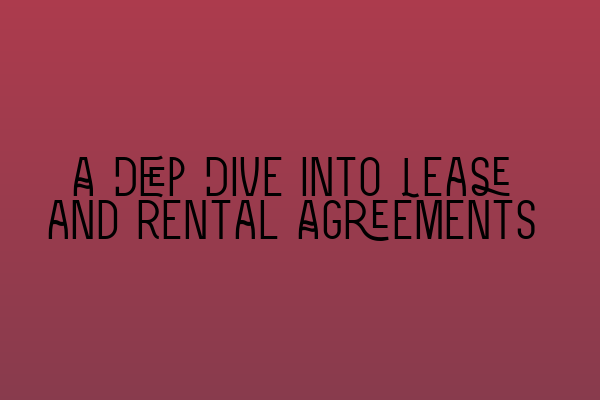A Deep Dive into Lease and Rental Agreements
Lease and rental agreements play a crucial role in numerous business transactions and personal arrangements. From commercial spaces to residential properties, these agreements govern the rights and obligations of both landlords and tenants. In this article, we will explore the intricacies of lease and rental agreements, shedding light on their key components, legal implications, and important considerations. Whether you are a business owner looking to lease a new office space or a tenant searching for a rental property, understanding the nuances of these agreements is vital.
The Basics: What are Lease and Rental Agreements?
Before delving deeper, let’s first establish what lease and rental agreements are and how they differ. Both these types of contracts are legally binding agreements that outline the terms and conditions under which a property is rented or leased. However, there are some fundamental distinctions that set them apart.
Rental agreements are typically shorter in duration and involve a month-to-month arrangement. These agreements often do not have a fixed term and can be terminated by either the landlord or the tenant with proper notice. On the other hand, lease agreements are usually long-term contracts, commonly spanning one year or more, with a fixed term specified in the agreement. Lease agreements provide stability to both parties and offer greater security to tenants.
Key Components of Lease and Rental Agreements
Lease and rental agreements contain several crucial components that define the rights and responsibilities of landlords and tenants. Understanding these key elements is essential for both parties.
1. Parties Involved: The agreement must clearly state the names and contact details of the landlord and tenant.
2. Property Description: A detailed description of the property being leased or rented, including its address and any specific identification details, should be included.
3. Term and Rent: The agreement should specify the duration of the lease or rental period and the amount of rent payable, along with any applicable penalties for late payments.
4. Security Deposit: Landlords often require tenants to provide a security deposit, which serves as a protection against any damages or unpaid rent. The terms and conditions related to the security deposit should be clearly laid out.
5. Maintenance and Repairs: The agreement should outline the responsibilities of both parties regarding the maintenance and repairs of the property. It should also specify who is responsible for utility bills.
6. Termination: The conditions and procedures for terminating the agreement should be clearly stated, including any notice periods required.
Legal Implications and Considerations
Lease and rental agreements are legally binding contracts, and failure to comply with the terms can lead to legal consequences. It is essential for both landlords and tenants to understand the legal implications and consider certain factors before entering into an agreement.
Related Article: Exploring the Impact of Frustration on Contractual Obligations: Legal Insights
Related Article: Interpreting Contractual Clauses: Unlocking the Hidden Meanings
Landlords should ensure that their lease agreement is legally sound and complies with all relevant laws and regulations. Similarly, tenants should carefully review the agreement to understand their rights and obligations. Consulting with a solicitor experienced in contract law is advisable to ensure a thorough understanding of the legal implications.
It is also recommended to consider obtaining appropriate insurance coverage to protect against unforeseen circumstances, such as property damage or personal injury. Both landlords and tenants should review the insurance provisions in the agreement to ensure adequate protection.
Conclusion
Lease and rental agreements serve as the foundation for landlord-tenant relationships, providing clarity and protection for both parties. Understanding the key components and legal implications of these agreements is crucial to avoid disputes and ensure a smooth tenancy or lease term.
Related Article: Legal Aspects of Business Contracts: Key Considerations for Entrepreneurs
Related Article: SQE Contract Law vs. Traditional Qualifications: A Comparative Analysis
Related Article: Agreements in Contract Law: Understanding Its Various Types
By familiarizing yourself with lease and rental agreements and seeking professional legal advice when needed, you can protect your rights and interests as either a landlord or a tenant. Remember, a well-drafted agreement is the key to a positive and successful property rental or leasing experience.
